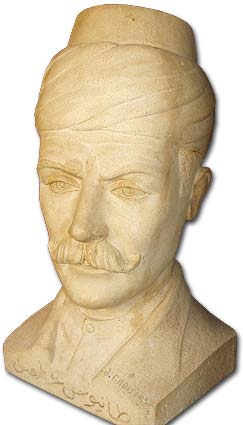 بطولة طانيوس شاهين
بطولة طانيوس شاهين
س- هل ان طانيوس شاهين كان حقيقة بطلاً ؟
ج- يدعي اصحاب بعثة ريفون واخصهم شميعه والقوال سابا ان شاهين كان بطلاً لم يظهر على الارض بطل مثله لكنهم لم يقولوا لنا ما هي اعمال بطولته سوى انه استولى على اغلال المشائخ وقتل بنت وأمها بجباية رجال تركيا.
ان القواميس حددت البطل انه ذاك الشخص الذي يقتحم الاخطار بدون خوف ولا يتراجع في المعركة ولو اصيب بالجراح او سقط فيها بعض اعوانه. فليدلنا المعجبو ببطولته اين رأوا افعاله البطولية فقد صار واضحاً وضوح النهار ان رجال الدولة التركية هم الذين دفعوه لجميع اعمال العنف لاجل تحقيق مقاصدهم الرديئة ضد لبنان، وهم الذين دفعوه اليها وهم الذين حموه وطمأنوا من اي أذى يلحق به كما اقر بذلك هو ذاته لصاحب تاريخ المقاطعة الكسروانية. واما هو فاذا كان مطبوعاً على الشر ( قضية لبنان ص 347 ) انقاذ لرغبتهم ولو كان فيها خراب بلاده. فلم تكن اعمال التخريب والظلم والنهب والتعدي والقتل التي اجراها في كسروان اعمالاً بطولية بل اعمالاً شريرة مضرة بمصلحة البلاد بجميع من فيه، ولا تدل الا على الرداء والشر والطمع والخيانة.
مرة واحدة دخل شاهين موقعة كانت تقتضي اظهار شجاعته وبطولته وقد تكفي لاعلانه بطلاً، تلك الموقعة هي التي ” تعقبه فيها يوسف بك كرم في محيطه وعقر داره وفي قلب منطقته، كرم الذي لمثله يحق لقب الابطال، فماذا كان موقف شاهين في تلك الموقعة، ومن حوله طابور من زلمه مسلحين بالبنادق. لما اطل عليهم كرم ذعروا واطلقوا عليه الرصاص من وراء الصخور العالية، فلم يحفل وظل متتبعاً لهم، وعندما اصيب احد اتباعه عند ذلك تبين كيف يكون البطل فان كرم قفز عن ظهر جواده ونادى اعوانه قائلاً : عليهم بالعصي فان العصا هي لمثل هؤلاء الاوباش يعني انه هو احتقرهم وعدّهم كلاباً وهجم مقابلاً رجالهم بصدره وعصاه متسلقاً الصخور بخفة الغزلان ورجاله تتبعه دون ان يفكروا بمبادلة الطلقات النارية بمثلها، واستولوا على القرية التي اخلاها الاخصام بسرعة، لان زعيمهم طانيوس شاهين كان السباق بين الفارين، ووقع البعض في ايدي رجال كرم فلم يمسوهم بأذى عملاً بأوامر كرم القاطعة واكتفوا بالقبض عليهم. تلك هي شيم النفوس الشريفة وتلك هي البطولة قابل بين هذه الاعمال النبيلة وعمل طانيوس شاهين في عجلتون.
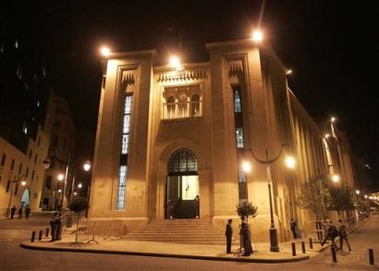 New York, 3 March (AKI) – United Nations secretary general Kofi Annan has welcomed the national dialogue officially initiated by the Lebanese speaker of parliament on issues critical for the country, expressing hope that it will contribute to political stability there. Last month, the UN Security Council said "a broad national dialogue" was needed in Lebanon to make more progress in satisfying its resolution 1559, which called for an end to foreign influence in Lebanon.
New York, 3 March (AKI) – United Nations secretary general Kofi Annan has welcomed the national dialogue officially initiated by the Lebanese speaker of parliament on issues critical for the country, expressing hope that it will contribute to political stability there. Last month, the UN Security Council said "a broad national dialogue" was needed in Lebanon to make more progress in satisfying its resolution 1559, which called for an end to foreign influence in Lebanon.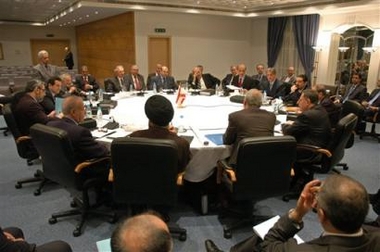 By Alaa Shahine, BEIRUT (Reuters) – Lebanon’s rival politicians met on Thursday for their broadest gathering since the 1975-90 civil war to tackle a political crisis over the role of Syria and its Lebanese allies that has paralyzed the government. The fate of President Emile Lahoud, who is under growing pressure to resign, will be among the most divisive issues on the table at so-called national dialogue talks that are expected to last up to a week.
By Alaa Shahine, BEIRUT (Reuters) – Lebanon’s rival politicians met on Thursday for their broadest gathering since the 1975-90 civil war to tackle a political crisis over the role of Syria and its Lebanese allies that has paralyzed the government. The fate of President Emile Lahoud, who is under growing pressure to resign, will be among the most divisive issues on the table at so-called national dialogue talks that are expected to last up to a week. 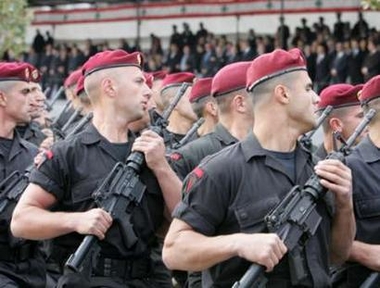 By Christine Spolar, CAIRO — U.S. military officials have been quietly assessing Lebanon’s military capability, making a general inventory of its army, air and naval forces, and suggesting reforms following a request last year from top Lebanese government officials. Brig. Gen. Mark Kimmitt, a top military planner, confirmed the review this week but would not elaborate on recommended reforms. The review was initiated after a request was made directly through the U.S. Embassy in Beirut, military and political sources said, and is part of a continuing process to help democratic forces in Lebanon.
By Christine Spolar, CAIRO — U.S. military officials have been quietly assessing Lebanon’s military capability, making a general inventory of its army, air and naval forces, and suggesting reforms following a request last year from top Lebanese government officials. Brig. Gen. Mark Kimmitt, a top military planner, confirmed the review this week but would not elaborate on recommended reforms. The review was initiated after a request was made directly through the U.S. Embassy in Beirut, military and political sources said, and is part of a continuing process to help democratic forces in Lebanon.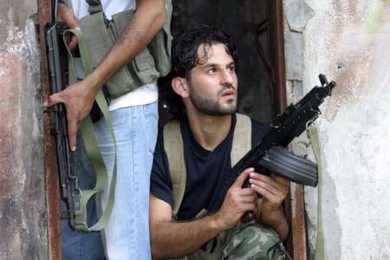 BEIRUT, 1 March (IRIN) – Young Lebanese, Palestinians and Sudanese want tougher gun control regulations, a survey by a group of NGOs revealed. The findings of the study, which was conducted over the last six months by the Middle East North Africa Network on Small Arms (MENSAA), an umbrella group of Arab NGOs concerned with the misuse and proliferation of illicit small arms and light weapons, were released on Tuesday in Beirut.
BEIRUT, 1 March (IRIN) – Young Lebanese, Palestinians and Sudanese want tougher gun control regulations, a survey by a group of NGOs revealed. The findings of the study, which was conducted over the last six months by the Middle East North Africa Network on Small Arms (MENSAA), an umbrella group of Arab NGOs concerned with the misuse and proliferation of illicit small arms and light weapons, were released on Tuesday in Beirut. 


